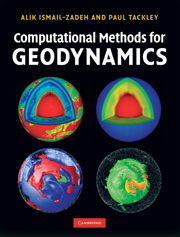Book contents
- Frontmatter
- Contents
- Foreword by Gerald Schubert
- Preface
- Acknowledgements
- 1 Basic concepts of computational geodynamics
- 2 Finite difference method
- 3 Finite volume method
- 4 Finite element method
- 5 Spectral methods
- 6 Numerical methods for solving linear algebraic equations
- 7 Numerical methods for solving ordinary and partial differential equations
- 8 Data assimilation methods
- 9 Parallel computing
- 10 Modelling of geodynamic problems
- Appendix A Definitions and relations from vector and matrix algebra
- Appendix B Spherical coordinates
- Appendix C Freely available geodynamic modelling codes
- References
- Author index
- Subject index
- Plates section
Preface
Published online by Cambridge University Press: 05 June 2012
- Frontmatter
- Contents
- Foreword by Gerald Schubert
- Preface
- Acknowledgements
- 1 Basic concepts of computational geodynamics
- 2 Finite difference method
- 3 Finite volume method
- 4 Finite element method
- 5 Spectral methods
- 6 Numerical methods for solving linear algebraic equations
- 7 Numerical methods for solving ordinary and partial differential equations
- 8 Data assimilation methods
- 9 Parallel computing
- 10 Modelling of geodynamic problems
- Appendix A Definitions and relations from vector and matrix algebra
- Appendix B Spherical coordinates
- Appendix C Freely available geodynamic modelling codes
- References
- Author index
- Subject index
- Plates section
Summary
The book of nature is written in the language of mathematics
(Galileo Galilei, 1564-1642)All the mathematical sciences are founded on relations
between physical laws and laws of numbers, so that
the aim of exact science is to reduce the problems of nature to
the determination of quantities by operations with numbers
(James Clerk Maxwell, 1831-1879)It is impossible to explain honestly the beauties of
the laws of nature in a way that people can feel,
without their having some deep understanding of
mathematics and its methods
(Richard Feynman, 1918-1988)Great advances in understanding of the planet Earth and in computational tools permitting accurate numerical modelling are transforming the geosciences in general and geodynamics particularly. Research on dynamical processes in the Earth and planets relies increasingly on sophisticated quantitative models. Improved understanding of fundamental physical processes such as mantle convection, lithospheric deformation, and core dynamos in the Earth and terrestrial planets depends heavily on better numerical modelling. Characteristic of this new intellectual landscape is the need for strong interaction across traditional disciplinary boundaries: Earth sciences, applied mathematics, and computer science.
Solid Earth scientists, with few exceptions, rarely achieve mathematical competence beyond elementary calculus and a few statistical formulae. Meanwhile, in some sense it has become a fashion nowadays, when scientists dealing with geodynamics make numerical modelling as their primary research tool.
Information
- Type
- Chapter
- Information
- Computational Methods for Geodynamics , pp. xiii - xviPublisher: Cambridge University PressPrint publication year: 2010
